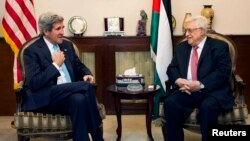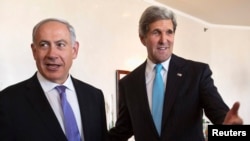JERUSALEM —
U.S. Secretary of State John Kerry met separately Friday with Israeli Prime Minister Benjamin Netanyahu, Israeli President Shimon Peres, and Palestinian President Mahmoud Abbas. The discussions were part of the latest push by the Obama administration to get the sides back to talks on a two-state solution. Kerry returns to Jordan Saturday to meet again with Abbas.
U.S. officials had nothing of substance to say about any of the talks.
Kerry's meeting in Jerusalem with Netanyahu was "a detailed and substantive conversation about the way forward," one official said. Lunch with President Abbas in Jordan was "a very constructive discussion that focused on the importance of moving the peace process forward."
Kerry has gone out of his way to keep details of this diplomacy private, reasoning that disclosing too much too soon gives political opponents of both Netanyahu and Abbas time to discredit those ideas before they are fully explained.
Kerry is downplaying the long-contentious issue of Israeli settlements. He is pushing both a private sector plan to boost economic development in the West Bank and high-tech answers to Israeli concerns about security in a two-state solution.
While he says he is not putting a deadline on a return to talks, Kerry says delay "allows a vacuum to be filled by people who don't want things to happen."
"The passage of time, obviously, has the ability to wear out people's patience and to feed cynicism and to give people a sense of impossibility where there is in fact possibility," said Kerry.
Palestinians backed off an early June deadline for restarting talks, now looking to September's start of the United Nations General Assembly. It was there last year that Palestinians won an overwhelming vote to boost their official U.N. status.
Without progress on a peace plan, Palestinians could this year move to join the U.N. Human Rights Commission and sign on to the International Criminal Court where they could push charges of Israeli war crimes. The United States was one of the few countries that voted against the Palestinians last year, and Kerry says a U.N. vote this September would be even more lopsided.
"With respect to September, long before September we need to be showing some kind of progress in some way because I don't think we have the luxury of that kind of time," said Kerry.
After Kerry's meeting with Abbas in Jordan Saturday, he returns to Jerusalem for talks with the chief Israeli negotiator, Tzipi Livni.
U.S. officials had nothing of substance to say about any of the talks.
Kerry's meeting in Jerusalem with Netanyahu was "a detailed and substantive conversation about the way forward," one official said. Lunch with President Abbas in Jordan was "a very constructive discussion that focused on the importance of moving the peace process forward."
Kerry has gone out of his way to keep details of this diplomacy private, reasoning that disclosing too much too soon gives political opponents of both Netanyahu and Abbas time to discredit those ideas before they are fully explained.
Kerry is downplaying the long-contentious issue of Israeli settlements. He is pushing both a private sector plan to boost economic development in the West Bank and high-tech answers to Israeli concerns about security in a two-state solution.
While he says he is not putting a deadline on a return to talks, Kerry says delay "allows a vacuum to be filled by people who don't want things to happen."
"The passage of time, obviously, has the ability to wear out people's patience and to feed cynicism and to give people a sense of impossibility where there is in fact possibility," said Kerry.
Palestinians backed off an early June deadline for restarting talks, now looking to September's start of the United Nations General Assembly. It was there last year that Palestinians won an overwhelming vote to boost their official U.N. status.
Without progress on a peace plan, Palestinians could this year move to join the U.N. Human Rights Commission and sign on to the International Criminal Court where they could push charges of Israeli war crimes. The United States was one of the few countries that voted against the Palestinians last year, and Kerry says a U.N. vote this September would be even more lopsided.
"With respect to September, long before September we need to be showing some kind of progress in some way because I don't think we have the luxury of that kind of time," said Kerry.
After Kerry's meeting with Abbas in Jordan Saturday, he returns to Jerusalem for talks with the chief Israeli negotiator, Tzipi Livni.





